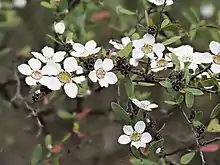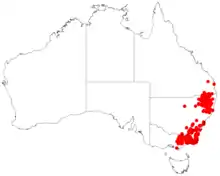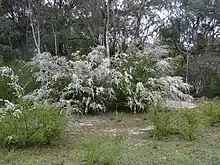Leptospermum brevipes
Leptospermum brevipes, commonly known as the slender tea-tree,[2] is a species of shrub or small tree that is endemic to eastern Australia. It has fibrous bark on the main stems, smooth bark on young stems, narrow elliptical to narrow egg-shaped leaves, white flowers and hemispherical fruit that is shed when mature.
| Slender tea-tree | |
|---|---|
 | |
| Leptospermum brevipes in Namadgi National Park | |
| Scientific classification | |
| Kingdom: | Plantae |
| Clade: | Tracheophytes |
| Clade: | Angiosperms |
| Clade: | Eudicots |
| Clade: | Rosids |
| Order: | Myrtales |
| Family: | Myrtaceae |
| Genus: | Leptospermum |
| Species: | L. brevipes |
| Binomial name | |
| Leptospermum brevipes | |
 | |
| Occurrence data from AVH | |

Description
Leptospermum brevipes is a shrub or small tree that typically grows to 4 m (13 ft) high. The bark on its larger stems is rough but young stems have smooth bark that is shed in stringy strips and have a flange near the base of the petiole. The leaves are narrow elliptical to narrow egg-shaped, 6–25 mm (0.24–0.98 in) long, 2–4.5 mm (0.079–0.177 in) wide, hairy at first but become glabrous. The flowers are borne singly or in pairs in leaf axils and are 6–8 mm (0.24–0.31 in) in diameter on a pedicel 2–8 mm (0.079–0.315 in) long. The floral cup is hairy and about 2 mm (0.079 in) long. The sepals are triangular, silky hairy and about 1 mm (0.039 in) long. The petals are white, 3–4 mm (0.12–0.16 in) long and the stamens are about 1 mm (0.039 in) long. Flowering occurs from October to December and the fruit is a silky-hairy, hemispherical capsule 3–4 mm (0.12–0.16 in) in diameter with the sepals attached and that is shed when mature.[2][3][4]
Taxonomy and naming
Leptospermum brevipes was first formally described in 1855 by Ferdinand von Mueller in his book Definitions of rare or hitherto undescribed Australian plants.[5][6] The specific epithet (brevipes) is a Latin word meaning "short-footed".[7]
Distribution and habitat
Slender tea-tree grows in woodland and shrubland, usually on rocky granite outcrops and near rocky streams. It occurs from the Granite Belt in south-eastern Queensland, mostly along the tablelands of New South Wales and the Australian Capital Territory to eastern Victoria.[2][3][4]
References
- "Leptospermum brevipes". Australian Plant Census. Retrieved 23 March 2020.
- "Leptospermum brevipes". Royal Botanic Garden Sydney. Retrieved 23 March 2020.
- Thompson, Joy (1989). "A revision of the genus Leptospermum (Myrtaceae)". Telopea. 3 (3): 382–383.
- "Leptospermum brevipes". Royal Botanic Gardens, Victoria. Retrieved 23 March 2020.
- "Leptospermum brevipes". APNI. Retrieved 23 March 2020.
- von Mueller, Ferdinand (1855). Definitions of rare or hitherto undescribed Australian plants. Melbourne: Goodhugh & Trembath. p. 45. Retrieved 23 March 2020.
- Short, Emma; George, Alex (2013). A Primer of Botanical Latin with Vocabulary. Cambridge, U.K.: Cambridge University Press. p. 27. ISBN 9781107693753.